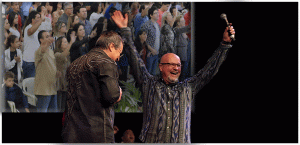 Reforming the Reformers
Reforming the Reformers
What happens when God wants to reform the reformers?
The initial forms of reform always demand the next step in reformation, but the initializing leaders have a very difficult time moving from protest into progress. Having fought with all they have for the initialization, they continue fighting the battle they already won.
The Reformation became a protest against Roman error. It remains so 500 years later. Its principles of sola scriptura are now slogans, not reality. Instead of the Bible becoming the Doorway to a kingdom culture, it became a wall for protesters to hide behind in the continued effort to fight the pope.
Fear of a pope produced polity and policy foreign to the Bible, taking a firm step back from the Bible to create a barrier zone apart from Roman error to guarantee “we never have another pope.” At the same time, the Bible’s clear instructions on leadership are ignored and leadership models borrowed from natural kingdoms dominate church-anity.
Fear of Roman Church produces a nearly infinite number of possible meanings for “church” that are now celebrated for their divisive distinctives so we can avoid “catholic” at all costs while moaning about our lack of oneness.
We actually celebrate our disagreements with illogical slogans and rah-rah cheers about “many streams but one river” and “we don’t have to agree to be buddies” and other incredibly stupid ideas. We even build massive structures of fairy tale proportions from the “I have sheep from another fold” as if Jesus was telling us not to worry about everyone be]ing confused to the point of a mental health breakdown about what the Bible says.
So, when reform comes, reformers fight God about reform the same way Roman Catholics fought the Reformation?
Reforming the Apostolic Restoration
What happens when the most fundamental reform since the Reformation needs to be reformed?
The initializing reformers continue fighting old battles because they defend themselves against old enemies. They continuing fighting the old battles at the expense of engaging in the next phase of expansion. They fight old battles with exaggerations of initializing ideas instead of maturing the ideas into operational models.
The idea that all five aspects of the leadership of Jesus remain fully available to the kingdom was not a new idea when it became a restoration. At no time in history was the kingdom without apostles and prophets. At no time in history was the kingdom without the full complement of gifts and leadership dynamics designed and defined by Jesus.
Those writing history rewrote it to fit their doctrinal idolatries. They simply ignored what they disliked, rewrote history to leave out spiritual gifts, and described heroes without identifying their leadership functions.
When the restoration of these kingdom leadership dynamics arrived, the leaders attempted to mainstream it through church-growthism. They assumed that the acceptance of apostles would be more natural to the existing church if they proved that apostles could grow mega-churches.
Then, church-growthism was applied to the restoration instead of the restoration being applied to church-growthism.
Church-growthism assumes the accumulation of believers led by a team of performing professionals. The greater the accumulation, the more successful the professionals. Applying the apostolic to this model gave us supermen instead of fathers.
The idea then became: to prove the restoration, we will accumulate apostles and prophets. So, the effort to identify valid apostles and prophets and accumulate them in networked structures became the highest. At the same time, the restoration of intercessors followed this schematic.
The reformers fell into the trap of church-growthism: accumulate believers without maturing them into leaders.
The immediate jump to a conclusion was “the apostle of the city pastors the largest church.” The immediate jump to a conclusion was “the prophets interact with the apostle” but remain in function consistent with the structures of church-growthism.
So, we accumulated intercessors, prophets, and apostles into networked structures to prove they existed, hoping to follow this new way of identifying leadership through mega-church models and take over the world by getting bigger and bigger.
In other words, we accept the most immature aspects of modern church-anity as basic to kingdom leadership, forgetting that church without kingdom has no place for kingdom leaders. Churches accepting the restoration attempted to restructure themselves. Some did so in ways they thought would accommodate the accepted norms of apostolic leadership (without producing apostolic people). Some did so simply by giving the figurehead leader a new title without changing anything at all.
In any case, the restoration did not mature people to restore function and did not mature the leadership dynamics of apostles and prophets at the foundational level of the kingdom as a means of reforming “church-anity.”
We have restoration. We do not have Reformation.
Reformation and Kingdom Culture
Jesus confronted the failure of His representative remnant to live and exhibit kingdom culture. They killed Him for it.
Jesus produced a new representative Remnant – “You will be My witnesses” – to live and exhibit kingdom culture. The greatest kingdom reset since David came through Jesus. We look back 500 years to the Reformation initialized by Martin Luther as a historic kingdom reset. We are now facing the need for a kingdom reset of similar scope and depth that asks us to restore what Jesus established and asks us to learn important lessons from the incompleteness of the Reformation.
We are entering a moment marked by God as significant as anything that has happened in the last 3,000 years of history. It is a classic showdown between the Inheritor of the Inheritance and the prince of this cosmic order, the spiritual conspiracy against Messiah Jesus and His claims on the nations.
We can worship the previous altars of reset or we can prepare the Lord a people ready to respond in the day of the New Era Reformation.
